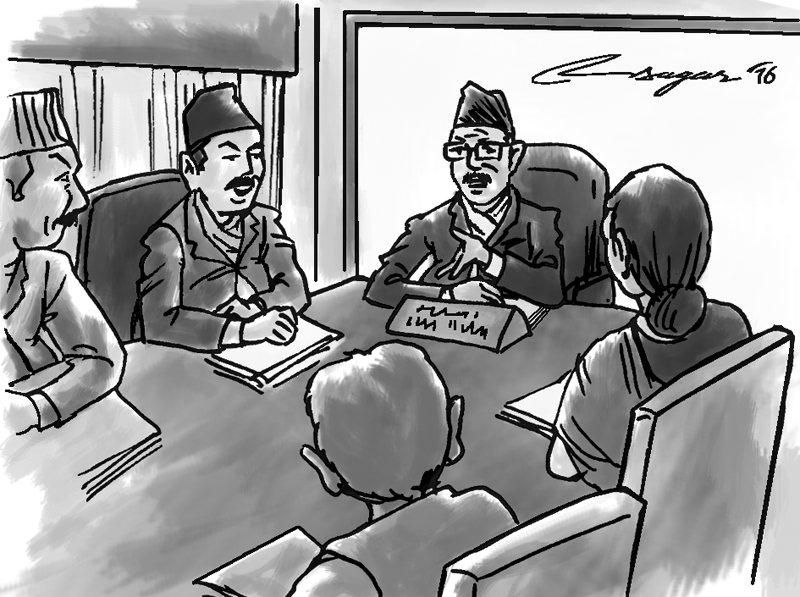State of transition: Drama unfolds
A stable government in itself is not enough but it is one key requirement for development. Without stability there is no consistency. Without stability the country is always in a state of transition. A number of current leaders are probably enjoying the state of transition as they are thinking they might get to take their turn
Let us for a second say Kathmandu represents Nepali Congress, Pokhara CPN (Maoist Center), and Hetauda FDMR.
For simplicity I will only look at these three parties. Like in our case the plan to topple the prior government and the structure of the new government had been going on for a while.
It is interesting that during the discussion the only thing that was agreed upon was to bring the no confidence vote and form a new government under the premiership of Pushpa Kamal Dahal.
Similarly, Nepali Congress, CPN (Maoist Center), and FDMR have their own agendas but there is no collective agenda and/or plan.
FDMR is holding up the plan by not coming to its destination on time. My guess is the longer they wait to join the government the better their leverage and they can negotiate better portfolios.
With no collective agenda the parties will be bickering with each other and pushing their individual agendas and I will not be surprised if nothing of consequence will be achieved at the end of this government.
At that time each party will have a solid story about how the incompetence and lack of support from other alliances put roadblocks on previously agreed upon agenda.
We just heard that and continue to hear from the outgoing PM KP Oli and all his predecessors before that. It does sound like a broken mike.
So, I ask myself, we know the plot, we know the characters, we know everything. Still we watch the drama unfold.
If each change of premiership were a movie we would now be watching the twenty second episode in about 25 years. The Rocky movies came up with seven movies (including Creed) in 42 years.
The embarrassing thing is, as episode twenty-two comes to a close we are already looking forward to episode twenty-three.
We are already asking if Dahal will stay for eight, nine, or twelve months, and will the agreement made between Nepali Congress and CPN (Maoist Center) still be honored.
We are so passionate about the story that we live and breathe each episode and live in the fantasy land that these politicians have created for us.
We stop and think about a new storyline. So here we are watching the musical chair being played over and over.
I think it is time to think about stopping the music. It is about time that we took our blindfold out and decided who sits on the chair. We should start to think about how we can stop this game.
It is about time we say enough is enough. We cannot have a change at the top every year. Dahal, who was thoroughly humiliated in the last general election, has used the system to become the Prime Minister of the country.
How can that be? Was KP Oli completely incompetent that we have to turn to Dahal? Or is it because the new leader of Nepali Congress, Sher Bahadur Deuba, wants to take part in the action?
When will the game of musical chair stop and we have some continuity in government and policies to take it forward. A constant and frequent change at the top will continue to send the country backwards.
Compare the situation in Nepal to the one that just transpired in the UK with the Brexit vote. Voting took place on 23 June. By 13 August the incumbent had resigned and a new Prime Minister was sworn in.
Brexit was a totally unexpected outcome. Even then the turmoil was sorted out in the next 20 days. Since 1990 Great Britain had 5 different Prime Ministers while Nepal had 22 (including multiple premierships).
It is true that Great Britain has one or the other party in a majority position most of the time. The first time David Cameroon become the Prime Minister he formed a minority government. We should look at these examples and try and follow them.
We actually do not need to go that far to look at the impact of a stable government. We can look at India and see how things changed before 1998 and after 1998.
A stable government in itself is not enough but it is one key requirement for development. It is, however, a requirement for progress. Without stability there is no consistency.
Without stability the country is always in a state of transition. Lots of current leaders are probably enjoying the state of transition as they are thinking they might get to take their turn.
Even if it is not the PM chair many of the leaders will be more than happy with a portfolio and accumulate some wealth. As people in Nepal are going through crisis after crisis this is not going to take us to the promised land.
Forget the promised land, it is not even going to maintain the status quo of the country.
My thought is that the next time the Nepali people go to vote we should look to see if we can give one party a chance. If that party does not bring results then move to the next party and so on.
Maybe eventually we will find a party and a leader that will take the country forward. This is difficult as it will mean voting against one’s philosophy and belief.
My answer to that question is, different philosophies are just different paths to a destination.
Thapa is a Nepali professional currently living and working in Texas, US






